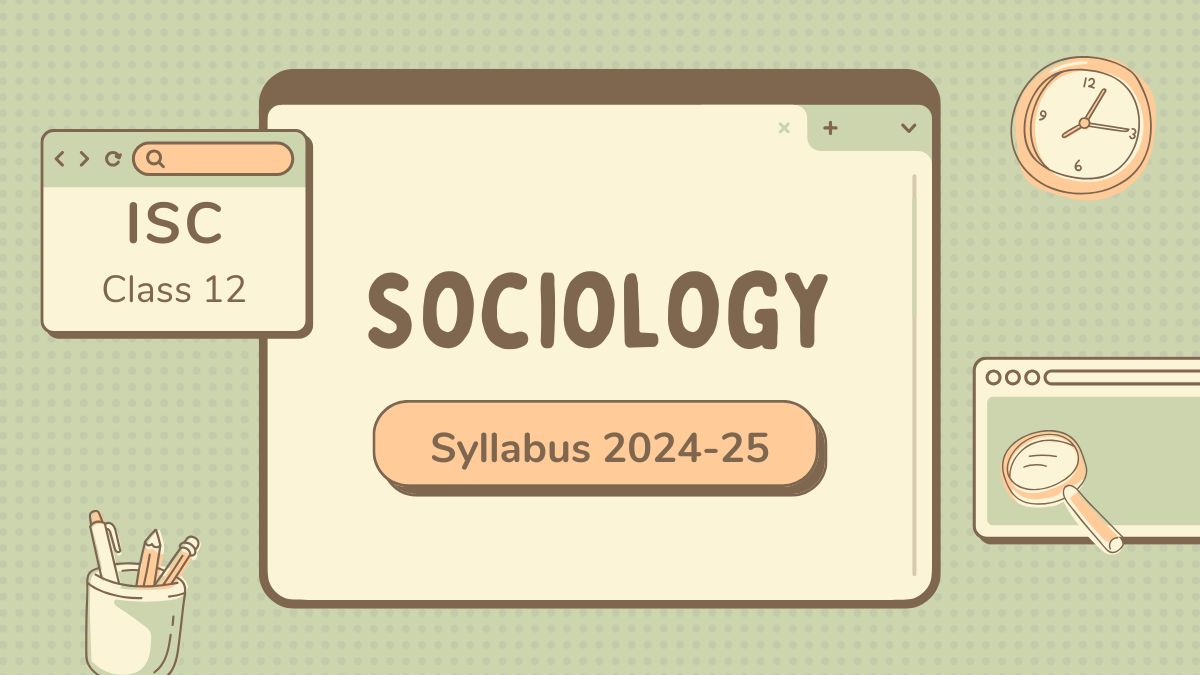The ISC Sociology syllabus provides a comprehensive study of social institutions, structures, and changes within society. Through theoretical learning and practical research, students will develop a strong understanding of sociological concepts, focusing on Indian contexts. This syllabus aims to equip students with analytical and research skills necessary for understanding social patterns and changes.
ISC Class 12 Sociology Syllabus 2024-25
The ISC Class 12 Sociology syllabus for 2024-25 focuses on various aspects of social structures, institutions, and dynamics of change. Students will learn about topics such as kinship, family, religion, social stratification, political and economic organization, tribal India, social change, and development. The syllabus also emphasizes empirical and ethnographic studies, enabling students to gain practical knowledge by conducting two research projects related to the topics covered in theory.
Paper I – Theory (70 Marks)
1. Social Institutions
(i) Definition and Features of Social Institutions:
Social institutions are established systems of social behavior, built on norms and values that serve essential functions in society.
(ii) Types of Social Institutions: Kinship, Marriage, and Family
- Kinship
- Meaning of kinship
- Types: Consanguineous (blood-related) and affinal (marriage-related) kinship
- Degree of kinship: Primary, secondary, tertiary
- Descent: Types (matrilineal, patrilineal, bi-lateral)
- Residence types: Matrilocal, patrilocal, avunculocal
- Kinship usages: Avoidance, joking relationship, teknonymy, avunculate, amitate, couvade; descriptive and classificatory kinship terms
- Marriage
- Definition and functions of marriage
- Rules: Exogamy (clan, gotra, pravara), endogamy (caste, varna), cousin marriages (cross, parallel), levirate, sororate, hypergamy, hypogamy
- Forms: Polygamy (polyandry, polygyny), monogamy
- Family
- Definition and features (MacIver’s features)
- Functions of the family
- Types: Consanguineous, conjugal, matriarchal, patriarchal, nuclear, joint families
- Structural and functional changes in family life
2. Religion and Society
(i) Definition of Religion and Science
Understanding the concepts of beliefs, rituals, superstitions, and taboos and their relevance.
(ii) Theories of Religion
- Animism (Tylor’s theory)
- Naturism (Max Mueller)
- Totemism
- Functional theories (Malinowski, Radcliffe-Brown, Durkheim)
(iii) Functions and Dysfunctions of Religion
Exploring both positive and negative roles of religion in society.
(iv) Morality and Social Control
Definition of morality, its relation to religion, and its role in maintaining social control.
3. Political Organization
Political Organization and Social Change
Understanding political organization, Panchayati Raj, 73rd Amendment, and the role of Panchayats in empowering women and children.
4. Economic Organization
(i) Definition of Economic Organization
Explaining economic and free goods.
(ii) Economies of Indian Tribes
Descriptions of tribal economies including food gathering, agriculture, handicrafts, pastoralism, and industrial labor.
(iii) Agrarian Economy, Jajmani System, and MGNREGA
Details of land relations, caste-based occupations, and rural employment programs.
(iv) Traditional Markets
Features of weekly markets and barter systems.
5. Tribal India – Past, Present, and Future
(i) Definition and Features of Tribe
Characteristics of tribes in India.
(ii) Dormitories in Tribal India
Features and functions of tribal dormitories and their cultural significance.
(iii) Present Conditions and Problems
Addressing issues such as economic, political, social, and cultural challenges faced by tribes. Discussing government policies for tribal upliftment.
6. Social Stratification
(i) Elements of Social Stratification
Definition and features of social stratification, class, caste systems, and social mobility.
(ii) Caste System
Exploring the theory of divine origin, merits, and demerits of the caste system. A comparison of caste and class.
(iii) Gender
Difference between sex and gender, patriarchal ideologies, and gender issues in India.
7. Social Change and Development
(i) Definition of Social Change and Development
Features and sources of social change.
(ii) Aspects of Development
Definitions of industrialization, urbanization, modernization, globalization, and sustainable development.
(iii) Social Movements
Meaning, causes, and societal impact of social movements.
(iv) Role of Education in Social Change
The function of education in creating social change, with a focus on the Right to Education (RTE).
(v) Role of Mass Media in Social Change
The influence of print, electronic, and audiovisual media, as well as the Right to Information (RTI).
Paper II – Practical Work (30 Marks)
Students are required to complete two studies based on topics from the theory syllabus. Each study will be assessed by both the teacher and an external examiner.
Assessment Criteria:
| Criteria | Teacher Marks | Examiner Marks |
|---|---|---|
| Process | 1 | |
| Understanding, Knowledge, and Analysis | 2 | 3 |
| Presentation | 2 | 4 |
| Viva | 3 |
ISC Class 12 Sociology Syllabus 2024-25 PDF Download
Students can easily access the ISC Class 12 Sociology Syllabus 2024-25 in PDF format for free. The PDF will help students prepare better for both the theory and practical papers. Having the PDF on hand will make it convenient for students to keep track of important topics and requirements for their projects and exams. The syllabus can be downloaded from the official website of the CISCE or from other educational platforms that provide the updated curriculum.
ISC Class 12 Sociology Syllabus 2024-25-Click Here To Download PDF
About The Author
Brajesh
Brajesh (MCA, M.Tech (IT)) is a passionate education and career content creator with a strong academic background in Computer Applications (MCA) and Technology (M.Tech). With years of hands-on experience in exam preparation strategies, syllabus analysis, and government job updates, he helps students and aspirants navigate their academic and professional journeys with clarity and confidence.

